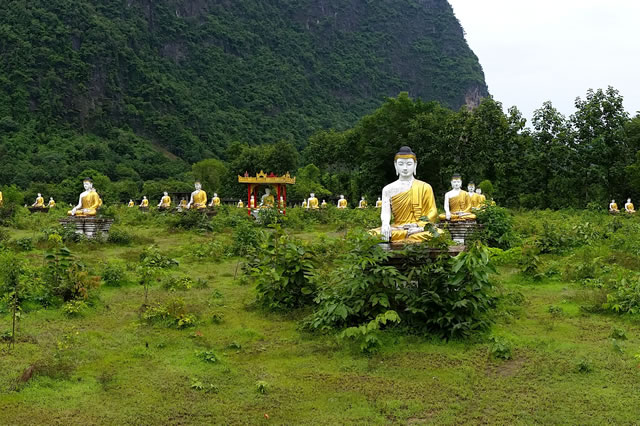Tourism in Ethnic Minority Areas in Myanmar

By Tulika Bansal and Vicky Bowman
Myanmar is going through a “triple transition”: from a military system to democratic governance, from a centrally directed economy to a market-oriented economy, and from 60 years of conflict to peace in its border areas inhabited by different ethnic groups. Ethnic minorities live mostly in the seven States along the border of the country. These areas have a high potential for tourism, due to their natural landscape with mountains, long coastline and islands, rich cultural heritage and their proximity to Thailand. As a result, they have been increasingly the focus of programmes intending to support tourism.
Kayin, Mon and Kayah States and Tanintharyi Region have all been affected by conflict for decades. The two largest ethnic armed groups in the area are the Karen National Union (KNU) and the New Mon State Party (NMSP), both of which have ceasefires with the Government. The Mon ceasefire is more stable and there are fewer factions than amongst the Karen.The New Mon State Party controls a number of ceasefire zones in Mon areas. There is significant insecurity in eastern areas of Mon State due to the presence of armed Mon bandits, and incidence of piracy in the Myeik archipelago. Since August 2013, four border checkpoints with Thailand including at Mae Sot-Myawadi have been opened to tourists for travel to Yangon. This could open up the area significantly both to Thai and foreign tourists coming from Thailand. However, infrastructure including transport links and hotels remains very limited and security remains problematic in some areas.
Businesses, non-state armed groups (NSAGs) such as the Karen National Union (KNU) and the New Mon State Party (NMSP), and civil society organizations in Kayin (Karen) and Mon States have mixed views about the appropriate timing of opening up the region to tourism. Some Kayin NSAGs in particular are opposed to development until a nationwide ceasefire and political dialogue are in place. While tourism is generally viewed as having less potential for negative impacts than extractive or agricultural concessions, Kayin NSAGs also fear that the Tatmadaw will use the excuse of providing security for tourists to extend their military presence.
Scepticism among the Karen
In Kayin areas, generally more negative views are held as to who has and will benefit from tourist concessions. There is a widespread view that this will mainly be crony businesses with local military connections, rather than local Karen. Another concern relates to the lack of consultations with civil society organizations and communities with regard to tourism projects. A hotel project built on a football ground in Hpa-an was halted in 2013 due to protests about lack of consultation.However, there are exceptions. Khiri Travel Myanmar, aYangon-based tour operator, is providing kayak tours in Kayin State with local villagers as guides, which has generated revenue of 10,000 USD for the community. The KNU is offering support to Karen entrepreneurs to set up local businesses, including by providing advice on financial resources, to help the Karen people to become more prosperous.
The current ceasefire, although still a long way from peace, presents opportunities to develop tourism. Further, through its promotion of dialogue, the value of local culture, the breaking down of cultural barriers and increased economic security, tourism can also make a positive contribution to creating a “culture of peace”.However, it is important to note that development does not incentivise peace, but rather that development and peace are complementary and mutually reinforcing processes.
Less concerns among the Mon
Leaders of other ethnic communities, including the Mon, appear more positive about early development of tourism than some Karen, and may face fewer challenges in relation to permissions. The Golden Rock pagoda in Kyaikhtiyo is a major attraction for locals as well as foreigners with Thai pilgrims. The Ministry of Hotel and Tourism is planning to develop five new tourist destinations in Mon state to attract more tourists. Some have already established local businesses and eco-tourism projects, and see tourism as a way to give recognition to and preserve heritage sites. However, in Mon State, as elsewhere, there are concerns that the tourism sector is currently dominated by businesses associated with the government. Recently the green light has been given to a local company to build a hotel and beach resort zone in Ye Township.
Major challenges
Many ethnic minority areas have considerable tourism potential. There are areas of historical and cultural significance (war cemeteries, the Burma Railway, pagodas and ethnic heritage buildings, great scenic beauty, and ecological significance). However, in some areas there is ongoing insecurity as well as landmine contamination which will need to be addressed. Poor infrastructure will hamper tourism and tourism development and distribution of revenues could potentially impact conflict dynamics, positively or negatively.
Companies looking to invest or run tours to such regions should consult with all relevant stakeholders, including ethnic leaders, non-state armed groups and conflict-sensitivity experts to ensure that tourism is desired and the timing is right. In particular, whilst engagement with civil society and community-based organizations will be important, such engagement should not be substituted for community consultation to assess what kind of tourism development the local community wants.
The article was originally published on www.tourism-watch.de and is based on excerpts from the Tourism Sector-Wide Impact Assessment (SWIA), published in February 2015 by the Myanmar Centre for Responsible Business (MCRB) in partnership with the Danish Institute for Human Rights and the Institute for Human Rights and Business
အထက်ပါအကြောင်းအရာနှင့်ပတ်သတ်၍ ဆက်လက်ဖတ်ရှုလိုပါက
- ခရီးသွားလာရေးလုပ်ငန်း
- စာတမ်းအသစ်နှင့် မကြာမီတွင် ကျင်းပပြုလုပ်မည့် ခရီးသွားလုပ်ငန်းကဏ္ဍ၏ လူ့အခွင့်အရေးဆိုင်ရာ အွန်လိုင်းဆွေးနွေးပွဲ
- မြန်မာ့ခရီးသွားလုပ်ငန်းကဏ္ဍအတွက် အဆိုပြုလွှာအသစ်
- Planning for a Brighter Future in Mrauk U: Cultural Heritage and Tourism Management
- 4th National Conference on Communities and Tourism 2019
 English
English မြန်မာ
မြန်မာ မြန်မာ (unicode)
မြန်မာ (unicode)








